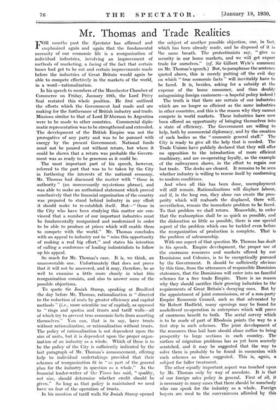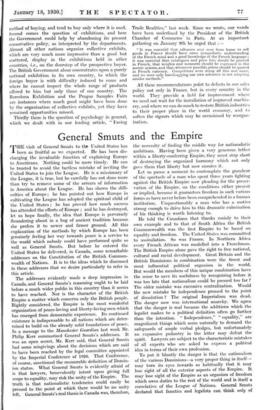Mr. Thomas and Trade Realities
FOR months past the Spectator has affirmed and emphasized again and again that the fundamental necessity of our economic life is a reorganization of individual industries, involving an improvement of methods of marketing, a facing of the fact that certain losses had got to be cut and certain improvements made before the industries of Great Britain would again be able to compete effectively in the markets of the world, in a word—rationalization.
In his speech to members of the Manchester Chamber of Commerce on Friday, January 10th, the Lord Privy Seal restated this whole position. He first outlined the efforts which the Government had made and are making for the furtherance of British industry and trade. Missions similar to that of Lord D'Abernon to Argentina were to be made to other countries. Commercial diplo- matic representation was to be strengthened and extended. The development of the British Empire was not the prerogative of any party and was to be pursued with energy by the present Government. National funds must not be poured out without return, but where it could be shown that a return was probable the Govern- ment was as ready to be generous as it could be.
The most important part of his speech, however, referred to the part that was to be taken by the City in furthering the interests of the national economy. Mr. Thomas had discussed the matter with " those in authority " (an unnecessarily mysterious phrase), and was able to make an authorized statement which proved conclusively that the financial organization of the country was prepared to stand behind industry in any effort it should make to re-establish itself. But—" those in the City who have been studying this matter are con- vinced that a number of our important industries must be fundamentally reorganized and modernized in order to be able to produce at prices which will enable them to compete with the world." Mr. Thomas concludes with an appeal to industry not to " miss this opportunity of making a real big effort," and states his intention of calling a conference of leading industrialists to follow up his appeal.
So much for Mr. Thomas's case. It is, we think, an unanswerable one. Unfortunately that does not prove that it will not be answered, and it may, therefore, be as well to examine a little more closely in what this reorganization consists, and also to answer some of the possible objections.
To quote Sir Josiah Stamp, speaking at Bradford the day before Mr. Thomas, rationalization is " directed to the reduction of costs by greater efficiency and capital methods " (i.e., more scientific use of capital), as opposed to " rings and quotas and trusts and tariff walls—all of which try to prevent true economic facts from asserting themselves." You can, that is to say, have trusts without rationalization, or rationalization without trusts. The policy of rationalization is not dependent upon the size of units, but it is dependent upon the proper organ- ization of an industry as a whole. Which of these is to be the policy of the City is sufficiently indicated by the last paragraph of Mr. Thomas's announcement, offering help to individual undertakings provided that their schemes of reorganization fit in " as part of the general plan for the industry in question as a whole." As the financial leader-writer of the Times has said, " quality, not size, should determine whether credit should be given." So long as that policy is maintained we need have no fear of the operation of trusts.
In his mention of tariff walls Sir Josiah Stamp opened the subject of another possible objection, one, in fact, which has been already made, and he disposed of it in the same breath. The protectionists say, " give us security in our home markets, and we will get export trade for ourselves." (cf. Sir Gilbert Wyle's comment on Mr. Thomas's speech.) But, to paraphrase the sentence quoted above, this is merely putting off the evil day on which " true economic facts " will inevitably have to be faced. It is, besides, asking for a subsidy at the expense of the home consumer, and thus doubly antagonizing foreign customers—a hopeful policy indeed !
The truth is that there are certain of our industries which are no longer so efficient as the same industries in other countries, and this is the reason why they cannot compete in world markets. These industries have now been offered an opportunity of bringing themselves into a state of efficiency. The Government are willing to help, both by commercial diplomacy, and by the creation of such bodies as the " economic general staff." The City is ready to give all the help that is needed. The Trade Unions have publicly declared that they will offer no opposition to the introduction of more efficient machinery, and are co-operating loyally, as the example of the railwaymen shows, in the effort to regain our lost trade. The decks are cleared. It remains to be seen whether _industry is willing to rescue itself by conforming to modern conditions.
And when all this has been done, unemployment will still remain. Rationalizations will displace labour, and if, in the long run, they alone can create the pros- perity which will reabsorb the displaced, there will, nevertheless, remain the immediate problem to be faced. To that problem we shall return. Meanwhile, in order that the reabsorption shall be as quick as possible, and the dislocation as little as possible, there is one special aspect of the problem which can be tackled even before the reorganization of production is complete. That is the problem of salesmanship.
With one aspect of that question Mr. Thomas has dealt in his speech. Empire development, the proper use of the enormous resources and markets offered by our Dominions and Colonies, is to be energetically pursued by the Government. It should be sufficiently obvious by this time, from the utterances of responsible Dominion statesmen, that the Dominions will enter into no fanciful schemes for a free trade Empire. There is no reason why they should sacrifice their growing industries to the requirements of Great Britain's decaying ones. But by the appointment of joint commissions, or of a non-party Empire Economic Council, such as that advocated by Sir Robert Hadfield, many openings may be found for unsheltered co-operation in enterprises which will prove of enormous benefit to both. The aerial survey which is to be made of part of Rhodesia points the way to a first step in such schemes. The joint development of the resources thus laid bare should alone suffice to bring prosperity to large sections in each country. The surface of migration problems has as yet been scarcely scratched, and it may be suggested that the way to solve them is probably to be found in connexion with such schemes as those suggested.. This is, again, a subject for fuller treatment..
The other equally important, aspect was touched upon by Mr. Thomas only by way of anecdote. It is that of our foreign sales policy in general. First of all, it is necessary in many cases that there should be somebody who can speak for the industry as a whole. Foreign buyers arc used to the conveniences afforded by this method of buying, and tend to buy only where it is used. Second comes the question of exhibitions, and here the Government could help by abandoning its present conservative policy, as interpreted by the departments. Almost all other nations organize collective exhibits, which are very much more impressive than a good but scattered, display in the exhibitions held in other countries, i.e., on the doorstep of the prospective buyer. The British Government alone concentrates upon a purely national exhibition in its own country, to which the foreign buyer is with difficulty induced to come and where he cannot inspect the whole range of products offered to him but only those of one country. The Barcelona Exhibition and the Prague Samples Fairs are instances where much good might have been done by the organization of collective exhibits, yet they have remained opportunities missed.
Thirdly there is the question of psychology in general, which we dealt with in our leading article, " Facing Trade Realities," last week. Since we wrote, our words have been underlined by the President of the British Chamber of Commerce in Paris. At an important gathering on January 9th he urged that :— " It was essential that salesmen sent over from home to sell goods in France should have some sympathetic understanding of the French mind and a good knowledge of the French language ; it was essential that eatalovos and price lists should be printed in French, that weights and measures should be expressed in the metric system, and that, whenever possible, prices should be quoted in French currency. Competitors were doing all this and morn, and we were only handicapping our own salesmen in not adopting similar methods."
All these recommendations point to defects in our sales policy not only in France, but in every country in the world. They provide a field for improvement where we need not wait for the installation of improved machin- ery, and where we can do much to restore British industries to their proper place in the world economy, and to soften the rigours which may be occasioned by reorgan- ization.







































 Previous page
Previous page